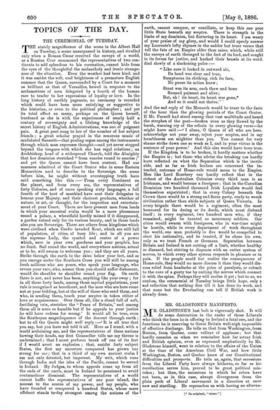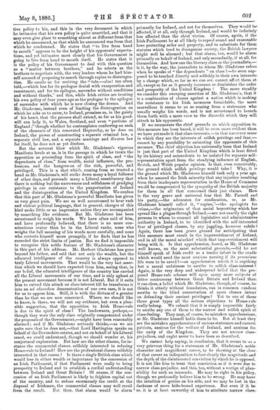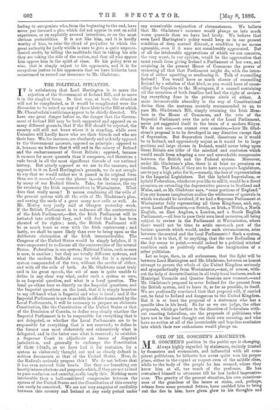MR. GLADSTONE'S MANIFESTO.
MR. GLADSTONE'S last bolt is vigorously shot. It will do some destruction in the ranks of those Liberals who think the boon he is offering to Ireland a fatal one, and the functions he is reserving to Great Britain well-nigh impossible of effective discharge. He tells us that from Washington, from Boston, from Quebec, come volleys of applause ; but that hardly consoles us when we remember how far astray Irish and British opinion, even as expressed emphatically by Mr. Gladstone himself, went in relation to the affairs of the Union at the time of the American Civil War, and how little Washington, Boston, and Quebec know of our Constitutional difficulties and prospects. He tells us, again, that secessions from the Liberal Party have always hitherto, so far as his recollection serves him, proved to be great political mis- takes; but then, the secessions to which he refers have not been, as in this case, abrupt divergences from the plain path of Liberal movement in a direction at once new and startling. He reproaches us with having no alterna-
[* In original. "stone."]
Live policy In his, and this in the very document in which he intimates that his own policy is quite unsettled, and that it may even give place to something almost as different from that which he announced, as that which he announced was from that which he condemned. He states that "to live from hand to mouth" appears to be the height of his opponents' expecta- tions, and yet intimates most clearly that his Government is going to live from hand to mouth itself. He states that it is the policy of his Government to deal with this question as a "matter between brothers," and he selects as the brothers to negotiate with, the very leaders whom he had him- self accused of proposing to march through rapine to disintegra- tion. He assails us for reviving the " tale,—alas! too often told,—which has for its prologue denial with exasperation and resentment, and for its epilogue, surrender without conditions and without thanks," and this, while Irish critics are treating his own policy of four years ago as the prologue to the epilogue of surrender with which he is now closing the drama. And Mr. Gladstone, instead even of limiting the disintegration on which he asks us to enter, to Ireland, promises us, in the gaiety of his heart, that the process shall extend, so far as his good- will can help it, to Wales, Scotland, and even "portions of England ;" though whether he contemplates conferring on each of the elements of this renovated Heptarchy, as he does on Ireland, the power of constructing a separate criminal law, a separate civil law, and a separate marriage and divorce law for itself, he does not as yet disclose.
But the severest blow which Mr. Gladstone's vigorous Manifesto levels at us, is in the passage in which he treats the opposition as proceeding from the spirit of class, and "the dependants of class," from wealth, social influence, the pro- fessions, and the hangers-on of the rich, powerful, and privileged. This is a shot which, coming from so trusted a hand as Mr. Gladstone's, will strike down many a loyal follower of other days, and persuade many a Liberal constituency that there is nothing but the narrowness and selfishness of grudging privilege in our resistance to the pauperisation of Ireland and the disintegration of the United Kingdom. We confess that this part of Mr. Gladstone's powerful Manifesto has given us very great pain. We are so well accustomed to hear rash and violent political language, that in general, charges of this kind make little or no impression unless they are accompanied by something like evidence. But Mr. Gladstone has been accustomed to weigh his words. We have often said of him, and have profoundly believed, that there is no more con- scientious orator than he in the Liberal ranks, none who weighs the full meaning of his words more carefully, and none who corrects himself more promptly, if he finds that he has exceeded the strict limits of justice. But we find it impossible to recognise this noble feature of Mr. Gladstone's character in this part of his address. Mr. Herbert Gladstone has gone beyond his father, and said that not only the wealth, but the educated intelligence of the country is always opposed to truly Liberal movements. That would be the very last asser- tion which we should have expected from him, seeing that, in oar belief, the educated intelligence of the country has carried all the Liberal movements of our time, and is only aghast at the present movement because it is not Liberal. But if it suits him to extend this attack on class-interest till he transforms it into an ad absurdum demonstration of our own case, it is not for us to oppose him. Still, it is with the dictum of a greater than he that we are now concerned. Where, we should like to know, is there, we will not say evidence, but even a plau- sible suggestion, that the opposition to Irish Home-rule is due to the spirit of class ? The landowners, perhaps,—
though they were the only class originally compensated under the proposals of the Government,—might have been reasonably alarmed ; and if Mr. Gladstone seriously thinks,—as we are quite sure that he does not,—that Lord Hartington speaks on behalf of the Devonshire estates, and not on behalf of his Liberal creed, we could understand, though we should wonder at, his conjectural explanation. But how are the other classes, for in- stance the commercial classes, selfishly interested in refusing Home-rule to Ireland? How are the professional classes selfishly interested in that course ? Is there a single British class which would lose in either wealth or importance by the concession of an Irish Parliament, if that Parliament were really to bring prosperity to Ireland and to establish a cordial understanding between Ireland and Great Britain ? Of course, if the con- cession of an Irish Parliament is likely to frighten capital out of the country, and to reduce enormously the credit at the disposal of Irishmen, the commercial classes may well recoil from the result. But then, that alarm would be alarm
primarily for Ireland, and not for themselves. They would be affected, if at all, only through Ireland, and would be infinitely less affected than the chief victim. Of course, again, if the. Irish Parliament be at all likely to repeal sound and reasonable laws protecting order and property, and to substitute for them statutes which tend to disorganise society, the British lawyers might well be alarmed ; but that alarm, too, would be alarm primarily on behalf of Ireland, and only secondarily, if at all, for themselves. And how can the literary class or the journalists,— is it, by the way, the journalists to whom Mr. Gladstone refers when he speaks of "the dependents" on class ?—be even sup- posed to be touched directly and selfishly in their own interests- by a change which, so far as we can see, cannot affect them at all, except so far as it gravely increases or diminishes the order and prosperity of the United Kingdom ? The more steadily- we consider this sweeping assertion of Mr. Gladstone's, that it is a combination of classes against a nation which is making the resistance to his Irish measures formidable, the more marvellous it seems to us as coming from a statesman who- usually weighs his words, and is not accustomed to launch, them forth with a mere view to the discredit which they will attach to his opponents. If we enumerate the chief grounds on which opposition to this measure has been based, it will be even more evident than we have yet made it that class-interests,---in that narrower sense in which they are the interests of selfish privilege and fear,— cannot by any possibility be animating the opponents of this, measure. The chief objection has universally been that Ireland is just that part of the United Kingdom which is least fitted by its history and antecedents to be isolated for separate self- representation apart from the steadying influence of English, Scotch, and Welsh popular opinion. Is that, even conceivably, the ground which selfish privilege would take? Why, it is the ground which Mr. Gladstone himself took only a year ago. when he assured the Irish minority that any injustice resulting from their inadequate representation in the House of Commons would be compensated by the sympathy of the British majority for them in all that concerned their just claims. How is the very grave and universal fear that Mr. Parnell and his party,—the advocates for confiscation, or, as Mr. Gladstone himself called it, "rapine,".—the apologists for crime,—the originators of that social boycotting which ha' spread like a plague through Ireland,—are not exactly the right persons to whom to commit all legislative and administrative authority in Ireland, to be identified with the self-interested fear of privileged classes, by any juggling, however subtle Again, there has been grave ground for anticipating that this measure must result in the impoverishment of Ireland, and in all the moral mischief which that impoverishment wilL bring with it. Is that apprehension, based, as Mr. Gladstone well knows, on the most substantial grounds,—did he not himself speak of Irish credit as a tender infant in the cradle which would need the most anxious nursing if its precarious life were to be saved ?—an apprehension which it is anything but a moral unfairness to ascribe to selfish class-interest 1?.
Again, is the very deep and widespread belief that the pro- posed Home-rule scheme will open many more subjects of
bitter controversy between Great Britain and Ireland than it can close, a belief which Mr. Gladstone, though, of course, he thinks it utterly without foundation, can in common candour ascribe to the blind conservatism of mere classes intent on defending their ancient privileges Yet to one of these three great types all the serious objections to Home-rule really belong. We submit that it is simply impossible fairly to ascribe any one of them to the narrow and selfish spirit of.
class-feeling. They may, of course, be mistaken apprehensions,. as Mr. Gladstone himself holds them to be. But at least they are the mistaken apprehensions of serious statesmen and earnest patriots, anxious for the welfare of Ireland, and anxious for_ the unity of the Kingdom. They are not narrow class- prejudices, and ought never to have been so described.
We cannot help saying, in conclusion, that it seems to us a very grievous thing for a statesman of Mr. Gladstone's noble- character and magnificent career, to be showing at the closer of that career an indisposition to face clearly the magnitude and the depth of the disinterested conviction by which he is opposed. It is not like him to treat that conviction as if it were due to narrow class-prejudice, and this, too, without a vestige of plau- sibility for such an innuendo. He may be right in his policy, though we profoundly believe him to be wrong. He may have the intuition of genius on his aide, and we may be lost in the. darkness of mere hide-bound experience. But even if it be so, it is at least unworthy of him to attribute narrow claw- feeling to antagonists who, from the beginning to the end, have never put forward a plea which did not appear to rest on solid experience, or on explicitly avowed intentions, or on the most obvious probabilities. It is not like him, and it is hardly worthy of him, to raise the cloud of prejudice to which the great authority he justly wields is sure to give a quite unprece- dented credit, by telling the multitude that in taking his side they are taking the side of the nation, and that all who oppose him oppose him in the spirit of class. Be his policy ever so wise, that is simply unjust to his opponents, and it is for scrupulous justice to his opponents that we have hitherto been accustomed to accord our reverence to Mr. Gladstone.
















































 Previous page
Previous page